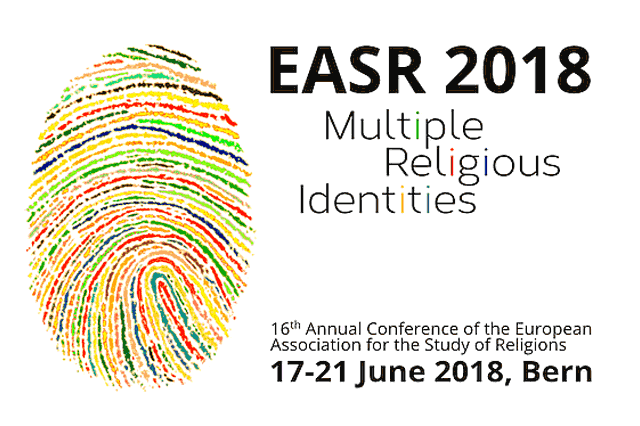Multiple Religious Identities – Individuals, Communities, Traditions

About The Event
16th Annual Conference of the European Association for the Study of Religions (EASR)
Call for Proposals
Date: June 17-21, 2018
Venue: University of Bern, Bern, Switzerland
Submission Deadline: December 1, 2017
As empirical realities, religions are never homogenous. From the multitude of beliefs, objects, feelings, discourses and practices of everyday lived religion, to major historical disputes that have led to the formation of different schools or movements, to conflict-laden divisions at the intersection of religion and politics, an extraordinary variety of contexts and content constitute the ubiquitous constant of religions across centuries and cultures from early civilizations to the immigrant societies of the 21st century, across Europe and beyond. The multiplicity of ways in which individuals form relationships with religious traditions and the plural modes of how religious codes are appropriated add further complexity to this picture.
It comes, therefore, as no surprise that plurality and its more normative pendant, pluralism, have always constituted key issues in religious identity debates: for instance, when religious diversity is set against claims of authenticity and orthodoxy with the discourse on conversion as an example. Plurality and pluralism are also at the core of political controversies, e.g., in discussions on social norms and alleged deviance on religious grounds.
Even though historical and contemporary research has drawn attention to the religious diversity within societies, the conceptualization and theorization of these issues remain difficult, given the inner plurality of religions and the multiple constructions of religious identities.
Key concepts such as world religions or syncretism have been the subject of severe criticism. This stemmed from more fundamental questions concerning the homogenizing effect of conceptual frameworks that are based, for instance, on a distinction between dominating and minority traditions.
Thus, an uncomfortable choice seems necessary: Do we let go our theoretical endeavor in favor of the multitude of individual cases or do we blur the manifold individual and social realities of religions through our generalizing concepts? Building on this constructive tension, this conference aims to provide a forum for historical and contemporary research as well as conceptual, methodological and theoretical reflections on the plurality and multiplicity of both religions and religious identities.
Topics may include the following:
- self-conceptions and identity discourses within religious communities and traditions
- multiple religious belongings in the past and the present
- conversion and the handling of converts
- debates on orthodoxy and heterodoxy, conformity and non-conformity
- missionary activities and religious exclusiveness
- normative concepts of plurality
- historical regulation of religious diversity
- the plurality of ritual practices
- secularity, secularities and forms of non-belief
- conceptual and theoretical reflections on terms and models
To submit for a pre-arranged session, you will be asked to give the title of the session, an abstract of its content and purpose (max. 500 words), the designated format, the name of the chair and, if already fixed, the speakers and preliminary titles of their papers. Furthermore, you will be asked to assign your proposal to a theme.
Important Dates
- Deadline for submitting pre-arranged sessions: October 1, 2017
- Announcement of approved pre-arranged sessions: November 1, 2017
- Deadline for submitting proposals for individual papers and contributions to announced sessions: December 1, 2017
- Notification of acceptance: January 15, 2018
Program Committee
- Chair of the Committee: Jens Schlieter (University of Bern)
- Martin Baumann (University of Lucerne)
- Philippe Bornet (University of Lausanne)
- Anja Kirsch (University of Basel)
- Karénina Kollmar-Paulenz (University of Bern)
- Christoph Uehlinger (University of Zurich)
- Andrea Rota (University of Bern)
- Helmut Zander (University of Fribourg)
Conference Website: http://www.easr2018.org/
Location
University of Bern


We're always eager to hear from you.
If you’d like to learn more about us or have a general comments and suggestions about the site, email us at